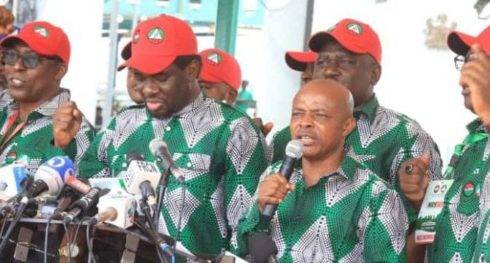The negotiations between organized Labour Unions leaders and the federal government regarding a new national minimum wage reached an impasse last Friday, culminating in the declaration of an indefinite strike. This development marks a significant setback in the efforts to secure an improved monthly take-home pay for Nigerian workers. Joe Ajaero, President of the Nigeria Labour Congress (NLC), announced in a press conference that the strike would commence at midnight on Sunday, June 2, 2024, citing the government’s failure to finalize negotiations on the new wage and reverse the recent electricity tariff hike.
Despite intervention attempts by the National Assembly’s leadership, the deadlock persisted, leading to a nationwide shutdown of critical infrastructures such as the national grid and Nigerian ports by early Monday, June 3, 2024. The strike’s ramifications were immediate and widespread, significantly undermining national security and economic stability. Additionally, activities in tertiary institutions and hospitals across the country were brought to a standstill as workers complied with union directives.
Government’s Perspective: Unrealistic Demands by Labour Unions leaders
The federal government has described the labour union leaders’ demands as unrealistic and economically unsustainable. According to Alhaji Muhammed Idris, the Information and National Orientation Minister, the union’s proposed minimum wage of N494,000 represents a staggering 1,547 percent increase from the current minimum wage set in 2019. He argued that meeting such demands would impose a crippling financial burden on the country’s economy, potentially totaling a N9.5 trillion bill for the government.
In a statement by Rabiu Ibrahim, the minister’s media aide, the government emphasized that its proposal already includes a 100 percent increase from the existing wage, which should be a reasonable compromise. Bayo Onanuga, Special Adviser on Information and Strategy to President Bola Tinubu, expressed disappointment over the strike, accusing labour unions of pursuing political objectives under the guise of industrial action. Onanuga stressed that the strike jeopardizes essential services, including healthcare, exacerbating the plight of ordinary Nigerians whom the labour unions claim to represent.
Public Reaction and Economic Impact
The indefinite strike has elicited mixed reactions from various sectors of the society. While some workers and their families view the strike as a necessary measure to demand fair wages amidst rising living costs, others are concerned about its immediate and long-term consequences on the economy and public welfare. The shutdown of essential services, particularly in the healthcare and education sectors, has left many Nigerians in a vulnerable position, unable to access critical medical care or continue their studies.
The economic impact of the strike is profound, with the closure of ports and the national grid disrupting business operations and trade. The financial markets have also reacted negatively, with increased volatility and investor uncertainty. Experts warn that prolonged industrial action could further strain Nigeria’s already fragile economy, potentially leading to increased unemployment and inflation. As the strike continues, the call for a balanced resolution that addresses both the workers’ needs and the economic realities of the country grows louder.
A Back-and-Forth Negotiation
The expiration of Nigeria’s 2019 minimum wage of N30,000 in April this year has led to prolonged negotiations between the government and labour unions. The need for a new national minimum wage has become urgent due to several economic challenges, including the fallout from the removal of fuel subsidies, the unification of exchange rates, and an increase in electricity tariffs. These factors have significantly impacted the cost of living, prompting labour union leaders to demand a substantial increase in the minimum wage.
The Nigerian Labour Congress (NLC) and the Trade Union Congress (TUC) have proposed a new minimum wage of N615,000, citing the rising cost of living across the country. However, the federal government has countered with a proposal of N60,000, which has been met with strong resistance from the labour unions. Despite attempts to negotiate, labor leaders have insisted on a minimum wage of N494,000, arguing that anything less would be insufficient to meet the basic needs of Nigerian workers.
A Dangerous Tactic
The impasse has led to threats of an indefinite strike by labour unions, which has raised concerns among analysts about the potential impact on national security and the economy. While strikes are a legal right of labour unions, analysts caution against using such measures to the detriment of the country’s stability. The recent threats to shut down the national grid and airports are seen as extreme measures that could alienate public support for the labour unions’ cause.
Public commentator Isa Lukman emphasized the importance of returning to the negotiation table to find a mutually beneficial solution. He argued that while the demand for a new minimum wage is justified, disrupting essential services and economic activities is a dangerous tactic that could have far-reaching negative consequences. Another analyst, Chris David, echoed these sentiments, warning that an indefinite strike could ultimately harm the very workers the labour unions seek to protect. Both commentators called for a more constructive approach to negotiations to ensure that the economy can recover and that workers receive fair compensation without resorting to drastic measures.
Table of Contents
Discover more from OGM News NG
Subscribe to get the latest posts sent to your email.














